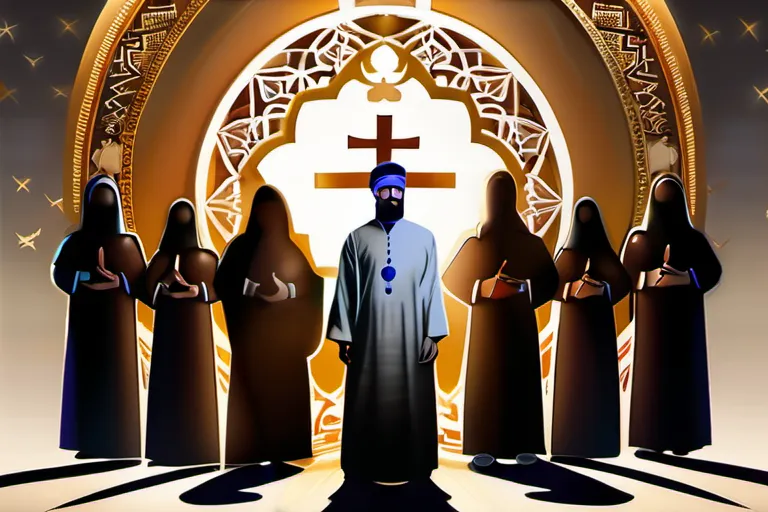Explore the role of moral codes in various religions, their origins, and their impact on society.
Moral codes play a crucial role in shaping societies and guiding individuals’ actions. In this article, we delve into the concept of moral codes in religion, exploring their origins, variations across different faiths, and their significance in modern times.
The Concept of Moral Codes in Religion
Defining Moral Codes in Religion: Have you ever wondered how different religions shape our understanding of right and wrong? The concept of moral codes is deeply rooted in religious traditions, serving as a guide for ethical behavior that extends beyond personal beliefs to influence entire societies. These codes are often seen as the heart of religion, providing a framework through which believers can navigate their daily lives.
Moral codes in religions like Christianity, Islam, Hinduism, Buddhism, and Judaism are not just abstract ideas; they are living documents that have evolved over centuries. Think of them as blueprints for ethical living, much like how architects design buildings to withstand the elements. Each religion offers unique perspectives on moral principles, reflecting the cultural and historical contexts in which these beliefs originated.
For instance, consider the Ten Commandments in Judaism: they set a clear path for societal order and individual behavior. In contrast, the Eightfold Path of Buddhism focuses more on personal enlightenment rather than external laws, emphasizing mindfulness and wisdom as means to achieve ethical living. These differences highlight the diversity within moral codes across religions, each offering its own interpretation of what constitutes right and wrong.
Understanding these moral codes is crucial not only for those who practice a religion but also for everyone seeking guidance on how to live ethically in a complex world. By delving into the origins and principles of these codes, we can better appreciate their impact on society and our shared human experience.
Origins of Moral Codes in Major World Religions
Have you ever wondered where the moral codes found in major world religions come from? These guidelines, often seen as divine mandates, have shaped societies for centuries. Let’s delve into the origins of these codes within Christianity, Islam, Hinduism, Buddhism, and Judaism.
In Christianity, the Ten Commandments form a cornerstone of moral guidance, derived directly from the Old Testament. But where did these commandments originate? Were they merely human inventions, or do they carry divine significance as many believe? These questions have echoed through Christian history, influencing everything from daily conduct to legal systems.
Turning our attention to
Travel further east to Hinduism, where the concept of dharma (duty or righteousness) serves as a moral code. It’s not just about avoiding sin; it’s about living in harmony with one’s true nature and fulfilling one’s role within society. How does this ancient philosophy impact modern Hindu communities, especially those facing contemporary ethical dilemmas?
Buddhism offers another perspective on moral codes through the Noble Eightfold Path. This path, designed to lead followers toward enlightenment, includes principles like right speech and right action. But what makes these practices unique in a world where secular ethics often prioritize individual rights over communal well-being? How do Buddhist communities reconcile these teachings with modern life?
In Judaism, the Torah provides a comprehensive moral framework for living, with commandments that cover everything from personal conduct to social justice. The question arises: how have Jewish communities interpreted and adapted these ancient codes over time? Are they strict guidelines or flexible principles that allow for interpretation in different contexts?
Each of these religions presents unique origins and interpretations of their moral codes. As we explore further, it becomes clear that these codes not only provide spiritual guidance but also play a crucial role in shaping societal norms. The journey from divine revelation to practical application is both fascinating and complex, reflecting the rich tapestry of human culture and belief.
The Role of Moral Codes in Shaping Societal Norms
How do moral codes shape our society? It’s like asking how the roots of a tree give it strength and direction. Just as these roots run deep underground, influencing every part of the plant above ground, so too do religious moral codes permeate society, shaping norms and behaviors.
In Christianity, for instance, the Ten Commandments serve as a cornerstone. These commandments not only guide believers but also influence wider societal laws around the world. Imagine these commandments like the north star, guiding both individual Christians and non-Christians alike towards ethical behavior. They teach us to honor God, respect parents, avoid theft, and more.
In Islam, Sharia law is a complex system that covers virtually every aspect of life, from family laws to commercial transactions. It’s as if the Quran’s teachings are a blueprint for society, dictating how people should live in harmony with both their Creator and each other. For example, the concept of Zakat (charitable giving) not only promotes social welfare but also instills a sense of community responsibility.
Hinduism, with its principle of dharma, offers guidance on righteousness through a complex web of duties and obligations based on one’s stage in life. This idea is like a map for individuals to navigate their paths through life, ensuring that every action aligns with cosmic order. The Bhagavad Gita, a sacred text, serves as a philosophical guide during moments of moral conflict, urging us to act selflessly and fulfill our duties.
Buddhism emphasizes the Four Noble Truths and the Eightfold Path, which focus on ending suffering through ethical living, mindfulness, and meditation. These teachings are like gentle winds guiding one towards inner peace and harmony with oneself and others. The emphasis is less on commandments and more on personal enlightenment, yet it still profoundly influences societal values.
Judaism, with its covenant between God and the people of Israel, lays down numerous laws that have shaped Western legal and ethical traditions. From dietary restrictions to Sabbath observance, these laws serve as a moral compass for Jews but also influence broader cultural norms. The idea of justice (tzedakah) is central, promoting fairness and kindness in society.
These religious moral codes are not just static rules; they’re dynamic forces that evolve with time, adapting to changing societal needs while maintaining core principles. They act like a living organism, growing and responding to the environment around them. Through these codes, religions continue to play an essential role in shaping our societies, making us question what it means to be moral beings.
Variations in Moral Codes Across Different Religions
Variations in Moral Codes Across Different Religions: A Comprehensive Guide
Imagine walking into a vast library where every book represents a different religion, each containing its own set of moral codes. How do these books differ? What common threads run through them all?
In Hinduism, the Dharma Shastras offer guidelines that are deeply rooted in the concept of karma, emphasizing righteousness and duty in one’s life. In contrast, Christianity focuses heavily on the Ten Commandments, which serve as a clear set of dos and don’ts for living a morally upright life.
Judaism, with its rich tapestry of laws laid out in the Torah, places great emphasis on mitzvot, or commandments, that go beyond mere ethical behavior. Islam’s moral codes are encapsulated in the Quran and Hadiths, guiding Muslims towards a life of submission to God (Allah). These guidelines extend from daily prayers to adherence to social norms.
Buddhism, on the other hand, focuses more on right conduct as part of the Eightfold Path. The path emphasizes ethical living, but it is less about strict adherence and more about achieving inner peace through mindfulness and meditation. This approach contrasts sharply with religions that have a more prescriptive list of rules.
The variations in moral codes across these religions are like branches on the same tree—they all seek to address humanity’s quest for meaning and morality, but each branch grows differently based on its unique context and history. For instance, the concept of ahimsa (non-violence) is central to Hinduism and Buddhism, reflecting a deep respect for all living beings, while in Islam, the concept of jihad emphasizes personal struggle rather than military conflict.
These differences highlight how moral codes are not static but evolve over time and place. Understanding these variations helps us appreciate the diversity within religions and can foster greater dialogue among different communities. After all, just as no two leaves on a tree are exactly alike, neither are the moral codes that guide our lives in various religions.
The Impact of Moral Codes on Modern Society
How do moral codes shape our modern society? They act like the invisible threads that weave through the fabric of human interaction, influencing everything from personal behavior to global politics. Imagine if every religion were a tree—each has its roots deeply embedded in ancient wisdom, but their branches and leaves can vary widely. Yet, they all contribute to the vast canopy of moral guidance under which we live.
Moral codes have played a pivotal role in shaping laws and values that govern our society today. For instance, take the concept of justice—a cornerstone in many religious teachings. How did this idea evolve into legal systems we see today? Is it merely a human invention or is there divine inspiration behind it?
The impact of moral codes extends far beyond legislations. They also shape our social attitudes and beliefs. Consider the value of honesty. In many religions, truth-telling is not just about avoiding lies but about fostering trust within communities. How does this value manifest in our everyday interactions? Do we always uphold it or do exceptions make us more flexible than we think?
Moral codes also influence ethical dilemmas faced by individuals and organizations. Take the issue of privacy, for example. In a world where technology has blurred the lines between personal and public, how do religious teachings guide us in making choices that respect individual rights while maintaining social order? Are we using these principles effectively, or are we merely paying lip service?
The impact of moral codes is not limited to specific communities; it ripples across cultures and continents. How can understanding the moral foundations of different religions help bridge gaps between diverse societies? For instance, could the emphasis on compassion in Buddhism and Christianity lead us towards more harmonious global interactions?
In conclusion, the impact of moral codes is profound and far-reaching. They guide our actions, inform our laws, shape our values, and challenge us to make ethical decisions every day. By exploring these codes, we can gain insights into how they influence our world and potentially find ways to live more harmoniously together.
Fostering Understanding and Tolerance through Knowledge of Moral Codes
How can understanding moral codes from different religions help us build bridges instead of walls? By delving into the origins and teachings of various faiths, we can uncover shared values that unite humanity rather than divide it. Just as a river carves its path through rock over time, so too do moral principles shape societies and guide individual behavior.
Imagine walking through a bustling bazaar where merchants from all corners of the world sell their goods. Each stall represents a different religion, with unique displays that catch your eye—some colorful, others simple but profound. If you take a closer look at each one, you might find common threads like compassion, honesty, and respect for life. By recognizing these similarities, we can foster an environment of mutual understanding and tolerance.
For instance, consider the Golden Rule in Christianity: ‘Do unto others as you would have them do unto you.’ This principle is echoed in Islam with the command to treat others as one wishes to be treated, and even in Hinduism through the concept of ahimsa, or non-violence. These moral codes are not just abstract ideas; they serve as practical guidelines for daily interactions, encouraging us to act with kindness and consideration.
Moreover, understanding these codes can help break down stereotypes and misconceptions. Take the often misunderstood concept of jihad in Islam, which many mistakenly associate solely with violent struggle. In fact, it means striving or effort—effort towards self-improvement and doing good deeds. By educating ourselves about such nuances, we can challenge negative perceptions and promote a more inclusive society.
So, let us embark on this journey of exploration together. Through the study of moral codes in religion, we can learn to see beyond our differences and embrace the common humanity that binds us all. Just as a tapestry gains depth with each additional thread, so too does our world gain richness when diverse perspectives and values are woven into its fabric.
Conclusion
 By understanding the moral codes that underpin various religions, we can gain valuable insights into human behavior and societal norms. This knowledge can help foster tolerance, empathy, and mutual respect among people of different faiths.
By understanding the moral codes that underpin various religions, we can gain valuable insights into human behavior and societal norms. This knowledge can help foster tolerance, empathy, and mutual respect among people of different faiths.











